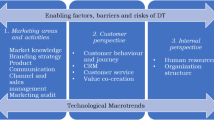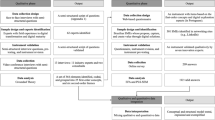Abstract
Extant research on knowledge transfer within multinational corporations has increasingly focused on knowledge flow, but ignored the process of knowledge translation. Building on translation theory, this article seeks to explain how the translation of relational practices by local Chinese managers occurs in a Swedish multinational corporation subsidiary in China. The findings show that middle managers in the subsidiary adopt three different translation strategies: symmetrical, asymmetrical and substitutive. These strategies and their key drivers, and implications for further research, are discussed.
Similar content being viewed by others
References
Balogun, J., Jarzabkowski, P. and Vaara, E. (2011) Selling, resistance and reconciliation: A critical discursive approach to subsidiary role evolution in MNEs. Journal of International Business Studies 42 (6): 765–786.
Becker-Ritterspach, F., Saka-Helmhout, A. and Hotho, J.J. (2010) Learning in multinational enterprises as the socially embedded translation of practices. Critical Perspectives on International Business 6 (1): 8–37.
Berger, P. and Luckmann, T. (1966) The Social Construction of Reality. London: Penguin.
Björkman, I., Stahl, G.K. and Vaara, E. (2007) Cultural differences and capability transfer in cross-border acquisitions: The mediating roles of capability complementarity, absorptive capacity and social integration. Journal of International Business Studies 38 (4): 658–672.
Brannen, M.Y. (2004) When Mickey loses face: Recontextualisation, semantic fit and the semiotics of foreignness. Academy of Management Review 29 (4): 593–616.
Brown, J.S. and Duguid, P. (2001) Knowledge and organisation: A social-practice perspective. Organisation Science 12 (2): 198–213.
Callon, M. (1986a) The sociology of an actor-network: The case of the electric vehicle. In: M. Callon, J. Law and A. Rip (eds.) Mapping the Dynamics of Science and Technology. Basingstoke, UK: Macmillan, pp. 19–34.
Callon, M. (1986b) Some elements of a sociology of translation: Domestication of the scallops and the fishermen of Saint Brieuc Bay. In: J. Law (ed.) Power, Action and Belief: A New Sociology of Knowledge? London: Routledge, pp. 196–233.
Callon, M. and Law, J. (1982) On interests and their transformation: Enrolment and counter-enrolment. Social Studies of Science 12 (4): 615–625.
Clark, E. and Geppert, M. (2011) Subsidiary integration as identity construction and institution building. Journal of Management Studies 48 (2): 395–416.
Cohen, W.M. and Levinthal, D.A. (1990) Absorptive capacity: A new perspective on learning and innovation. Administrative Science Quarterly 35 (1): 128–152.
Cook, S.D.N. and Brown, J.S. (1999) Bridging epistemologies: The generative dance between organisational knowledge and organisational knowing. Organisation Science 10 (4): 381–400.
Czarniawska, B. (2008) A Theory of Organising. Cheltenham, UK: Edward Elgar.
Czarniawska, B. and Joerges, B. (1996) Travels of ideas. In: B. Czarniawska and G. Sevón (eds.) Translating Organisational Change. Berlin: Walter de Gruyter, pp. 13–48.
Czarniawska-Joerges, B. and Sevón, G. (1996) Translating Organisational Change. Berlin: Walter de Gruyter.
Deleuze, G. (1994) Difference and Repetition. London: Athlone.
Derrida, J. (2001) Writing and Difference. London: Routledge.
Dhanaraj, C., Lyles, M.A. and Steensma, H.K. (2004) Managing tacit and explicit knowledge transfer in IJVs: The role of relational embeddedness and the impact on performance. Journal of International Business Studies 35 (5): 428–442.
Dutton, J., Worline, M. and Frost, P. (2006) Explaining compassion organizing. Administrative Science Quarterly 51 (1): 59–96.
Eisenhardt, K.M. (1989) Building theories from case study research. Academy of Management Review 14 (4): 532–550.
Elkjaer, B. (2003) Social learning theory: Learning as participation in social processes. In: M. Easterby-Smith and M.A. Lyles (eds.) Blackwell Handbook of Organisational Learning and Knowledge Management. Malden, MA: Blackwell, pp. 38–53.
Gupta, A.K. and Govindarajan, V. (2000) Knowledge flows within multinational corporations. Strategic Management Journal 21 (4): 473–496.
Kogut, B. and Zander, U. (1992) Knowledge of the firm, combinative capabilities and the replication of technology. Organisation Science 3 (3): 383–397.
Kogut, B. and Zander, U. (1993) Knowledge of the firm and the evolutionary theory of the multinational corporation. Journal of International Business Studies 24 (4): 625–645.
Kostova, T. (1999) Transnational transfer of strategic organisational practices. Academy of Management Review 24 (2): 308–324.
Lakoff, G. and Johnson, M. (1980) Metaphors We Live by. Chicago, IL: University of Chicago Press.
Latour, B. (1987) Science in Action: How to Follow Scientists and Engineers through Society. Cambridge: Harvard University Press.
Latour, B. (1988) The Pasteurisation of France. Cambridge: Harvard University Press.
Latour, B. (2002) Morality and technology. Theory, Culture & Society 19 (5–6): 247–260.
Latour, B. (2005) Reassembling the Social: An Introduction to Actor-network Theory. Oxford: Oxford University Press.
Lave, J. and Wenger, E. (1991) Situated Learning: Legitimate Peripheral Participation. Cambridge: Cambridge University Press.
Levitt, B. and March, J.G. (1988) Organizational learning. Annual Review of Sociology 14: 319–340.
Lock, M. (1993) Cultivating the body: Anthropology and epistemologies of bodily practice and knowledge. Annual Review of Anthropology 22: 133–155.
Mauss, M. (1966) The Gift: Forms and Functions of Exchange in Archaic Societies. London: Cohen & West.
Miles, M.B. (1979) Qualitative data as an attractive nuisance: The problem of analysis. Administrative Science Quarterly 24 (4): 590–601.
Nonaka, I. (1994) A dynamic theory of organisational knowledge creation. Organisation Science 5 (1): 14–37.
Orlikowski, W.J. (2002) Knowing in practice: Enacting a collective capability in distributed organizing. Organisation Science 13 (3): 249–273.
Ortner, S.B. (1984) Theory in anthropology since the sixties. Comparative Studies in Society and History 26 (1): 126–166.
Pickering, A. (1995) The Mangle of Practice: Time, Agency, and Science. Chicago, IL: University of Chicago Press.
Piekkari, R. and Welch, C. (2010) The human dimension in multinational management. Scandinavian Journal of Management 26 (4): 467–476.
Polanyi, M. (1966) The Tacit Dimension. Gloucester, UK: Peter Smith.
Pratt, M.G. (2009) For the lack of a boilerplate: Tips on writing up (and reviewing) qualitative research. Academy of Management Journal 52 (5): 856–862.
Reckwitz, A. (2002) Toward a theory of social practices: A development in culturalist theorizing. European Journal of Social Theory 5 (2): 243–263.
Saka, A. (2004) The cross-national diffusion of work systems: Translation of Japanese operations in the UK. Organisation Studies 25 (2): 209–228.
Saka-Helmhout, A. (2011) Learning from the periphery: Beyond the transnational model. Critical Perspectives on International Business 7 (1): 48–65.
Schatzki, T.R. (1996) Social Practices: A Wittgensteinian Approach to Human Activity and the Social. Cambridge: Cambridge University Press.
Schatzki, T.R. (1997) Practices and actions: A wittgensteinian critique of bourdieu and giddens. Philosophy of the Social Sciences 27 (3): 283–308.
Schatzki, T.R. (2003) A new societist social ontology. Philosophy of the Social Sciences 33 (2): 174–202.
Schatzki, T.R. (2006) On organisations as they happen. Organisation Studies 27 (12): 1863–1873.
Sieber, S.D. (1976) A synopsis and critique of guidelines for qualitative analysis contained in selected textbooks. Project on Social Architecture in Education. New York: Center for Policy Research.
Star, S.L. and Griesemer, J.R. (1989) Institutional Ecology, ‘translations’ and boundary objects: Amateurs and professionals in Berkeley's museum of vertebrate zoology, 1907–1939. Social Studies of Science 19 (3): 387–420.
Suchman, L. (2007) Human-Machine Reconfigurations: Plans and Situated Actions. Cambridge: Cambridge University Press.
Szulanski, G. (1996) Exploring internal stickiness: Impediments to the transfer of best practice within the firm. Strategic Management Journal 17: 27–43.
Uzzi, B. and Lancaster, R. (2003) Relational embeddedness and learning: The case of bank loan managers and their clients. Management Science 49 (4): 383–399.
Weissbort, D. and Eysteinsson, A. (2006) Translation Theory and Practice. Oxford: Oxford University Press.
Welch, C. and Piekkari, R. (2006) Crossing language boundaries: Qualitative interviewing in international business. Management International Review 46 (4): 417–437.
Westley, F.R. (1990) Middle managers and strategy: Microdynamics of inclusion. Strategic Management Journal 11 (5): 337–351.
Whitley, R. (2007) Business Systems and Organisational Capabilities. Oxford: Oxford University Press.
Yakhlef, A. (2002) Towards a discursive approach to organisational knowledge formation. Scandinavian Journal of Management 18 (3): 319–339.
Yanow, D. (2004) Translating local knowledge at organisational peripheries. British Journal of Management 15 (1): 9–25.
Yin, R.K. (1994) Case Study Research: Design and Methods. Thousand Oaks, CA: Sage.
Acknowledgements
This study was supported through a post-doctoral research scholarship granted to the first author by the Jan Wallander and Tom Hedelius Foundation. We would like to express appreciation for the valuable support and feedback on prior versions of this article by the outgoing Editor-in-Chief Harukiyo Hasegawa and two anonymous reviewers. We also thank the participants of the Management Innovation Practices Research Programme at Stockholm University School of Business for constructive comments on an earlier draft; and the members of SBCC who participated in this research.
Author information
Authors and Affiliations
Rights and permissions
About this article
Cite this article
Demir, R., Fjellström, D. Translation of relational practices in an MNC subsidiary: Symmetrical, asymmetrical and substitutive strategies. Asian Bus Manage 11, 369–393 (2012). https://doi.org/10.1057/abm.2012.13
Received:
Revised:
Accepted:
Published:
Issue Date:
DOI: https://doi.org/10.1057/abm.2012.13




